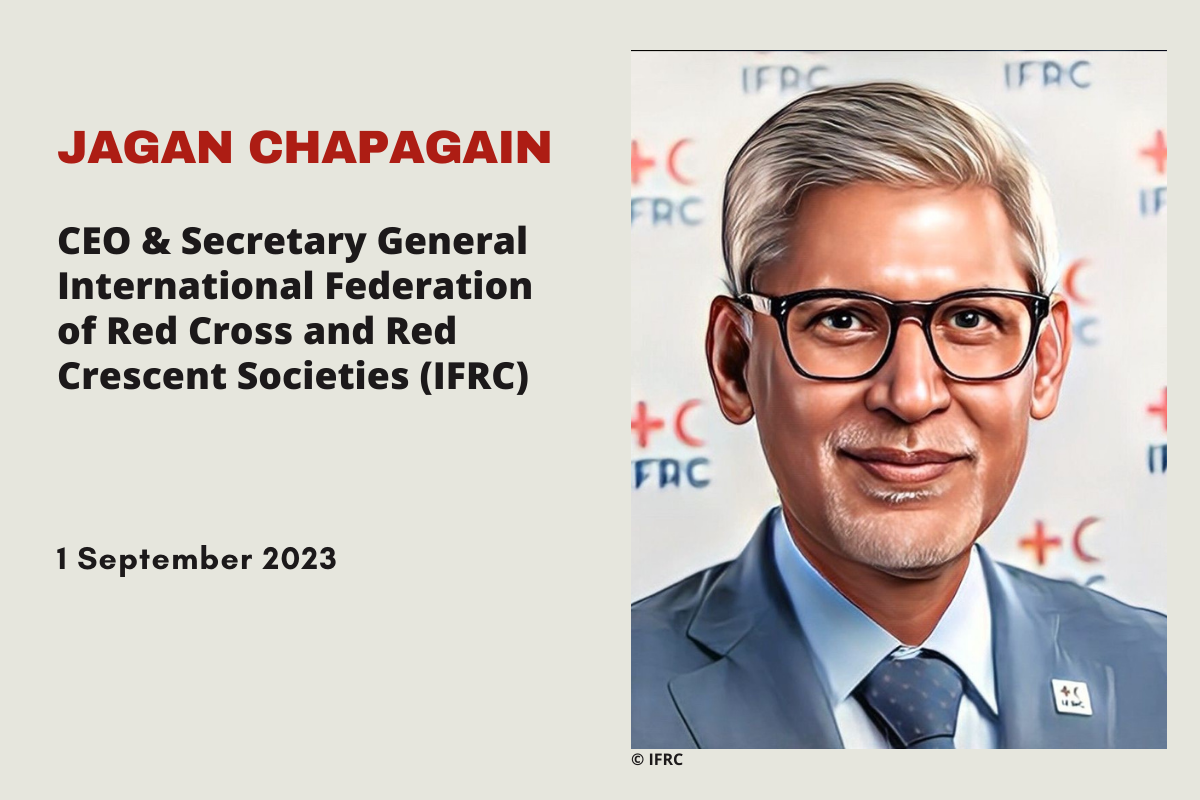The interview | Jagan Chapagain
 |
How would you present your organization in a few words? What entails your position? What is your goal? |
The International Federation of Red Cross and Red Crescent Societies (IFRC) can best be understood as a global network with local reach. It is a network of 191-member Red Cross and Red Crescent Societies making it near universal while 16.5 million volunteers who come from the communities make it a truly local network. It responds whenever humanitarian needs arise, it works with communities to reduce the needs by building resilience, and it advocates for accountable humanitarian action all the time. It embodies the humanitarian-development-climate nexus in its action.
As CEO and Secretary General of the IFRC, my role entails being an ambassador for the world’s largest humanitarian network, while leading our efforts to be ever more focused, engaged, innovative, accountable, and trusted organization through leadership, transformation, and by leveraging the power of membership.
In the context of a world where climate change is compounding multiple crises, health needs are multiplying in the aftermath of COVID-19, continuing increase of migration and displacement and many factors that result in people getting excluded from development gains – preparedness, and anticipatory action are key. My goal is to ensure that our IFRC network is well-prepared, well-equipped, and ready to meet these challenges head-on.
 |
Among the concentration of actors in Geneva (IOs, NGOs, permanent missions, academia, and the private sector), who do you work with and how? |
Collaboration is integral to our work. Positive impact requires solidarity and an openness to working with and being inclusive of many partners across various sectors. The IFRC engages with a wide range of stakeholders and partners at all levels, but especially with local actors and their communities.
Our work is for and with the National Red Cross and Red Crescent Societies because they are at the heart of humanitarian action. They are there before, during, and after a crisis and are therefore our foundation in delivering humanitarian assistance and building community resilience.
We also collaborate with IOs and NGOs to ensure a unified humanitarian action, work with academia to enhance research and innovation in humanitarian fields, engage in humanitarian diplomacy with state authorities to advocate on behalf of crisis-affected people, and partner with the private sector to develop innovative financing mechanisms that empower our work.
Our guiding light will always be our seven fundamental principles – humanity, impartiality, neutrality, independence, voluntary service, unity, and universality. All our efforts and actions are underpinned by these principles – and through partnerships, resource sharing, and technical knowledge exchange, we can amplify our impact and ensure a coordinated and comprehensive humanitarian action, safeguarding the dignity of every individual and community everywhere.
 |
What are the strengths and weaknesses of Geneva with regards to the development of your activity? |
Geneva serves as a hub for international cooperation and diplomacy, providing a platform for dialogue and coordination. The city’s physical and symbolic proximity to various international organizations and diplomatic missions allows for greater engagement and advocacy on behalf of the individuals and communities with humanitarian needs.
However, the city can also hold challenges for those who undertake humanitarian activities precisely due to those same reasons. Complexities arise when navigating diverse agendas and priorities, during growing resource limitations, and at a time when humanitarian-development needs are on the rise. All actors in Geneva have a responsibility to balance these dynamics while creating an atmosphere of mutual collaboration and support. This is crucial for advancing our humanitarian objectives.
 |
What do you think global governance should look like 20 or 30 years from now? |
When I think about global governance in 20 or 30 years, I envision localization first and foremost. I envision a rethinking of the global humanitarian-development sector from the ground-up, centering local communities and accepting them as the leaders of the actions that affect their lives.
Effective global governance should encourage knowledge sharing, technology transfer, and resource allocation tailored to local needs. Local communities would also hold decision-making power, as they possess a firsthand understanding of contextual challenges and cultural dynamics.
International organizations would continue to play a role as facilitators, sharing expertise, investing in capacity strengthening, and coordination support to local communities and organizations. Decision-making becomes a collective effort where global commitments and efforts are contextualized by local leadership and insights, ensuring sustainability, equitable resource distribution, and visibility for areas of the world that don’t receive the attention they need.
This type of global governance that I am describing - a network of interconnected, locally empowered nodes, forming a responsive, resilient, and inclusive framework that addresses global challenges while respecting the wisdom and agency of local communities – is not only effective and impactful, it also is the right thing to do. Localization is self-determination, and the communities we partner with deserve nothing less.
 |
What question would you like to have been asked? And what keeps you “awake at night”? |
I would have liked you to ask me, “What gets you up each morning?” I find this more pertinent than what keeps me awake at night.
Having spent my career in the humanitarian field has meant that I have seen, intimately, the suffering and the hardship that are so prevalent during humanitarian emergencies and crises. But I have also seen hundreds of millions of people left out of the development gains who feel excluded. While we must ramp up our humanitarian response every time a crisis hits humanity, we must do much more to strengthen the resilience of people and their communities through an inclusive humanitarian-development-climate nexus approach. Investing in reducing the needs is critical before the humanitarian system buckles under the pressure of ever-growing needs.
I believe that to conduct our work well in this field, it’s necessary to cultivate a resilient spirit and a sense of optimism – otherwise we risk falling into cynicism, which can be both devastating and paralyzing.
So, what gets me out of bed each morning is my belief that if we all work together, not in competition but in cooperation, it is possible to reduce the humanitarian needs thereby preventing human suffering and loss. Kindness is needed now more than ever before – and the thought of the selfless commitment of our volunteers all over the world to enact positive transformations in the lives of people is inspiring to me.
